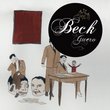| All Artists: Harmonia Title: Music of Eastern Europe Members Wishing: 1 Total Copies: 0 Label: Trad. Crossroads Release Date: 10/21/2003 Genres: International Music, Pop, Rock Style: Number of Discs: 1 SwapaCD Credits: 1 UPC: 780702431325 |
Search - Harmonia :: Music of Eastern Europe
 | Harmonia Music of Eastern Europe Genres: International Music, Pop, Rock
|
Larger Image |
CD DetailsSimilar CDs
Similarly Requested CDs
|
CD ReviewsCleveland-based ethnic band offers up superior fare! slovakgirl5 | Cleveland, Ohio USA | 05/11/2005 (4 out of 5 stars) "If you are drawn to the indigenous music of the European Slavic countries, be sure and purchase this CD by Cleveland-based Harmonia. Founded in 1992 by accordionist/bandleader Walt Mahlovich, the album is a pastiche of varied instruments, harmonies and dances. Songs and dances from nearly all of the Slavic countries populate this CD(including that of the Romany/Gypsy)to produce innovative and fiery melodies. These folk tunes, which range from swirling circle dances to soft, minor-key ballads, are played on a variety of traditional instruments ranging from the tamburica to the duodencivka. The CD begins with a sarda (a Romanian circle dance) in 6/8 time. The cimbalon here provides a hypnotic beat, enabling the "dor" theme of nostalgia to emerge. The second selection is a plaintive travnica, sung in the "open throat" tradition by the very talented chanteuse, Beata Beginovia, a native of Slovakia. The Bukovina region makes the next appearance and musician Andrei Pidkivka exhibits his virtuosity on the sopilka (wooden flute). The 4th selection on the CD, a gypsy wedding dance, is unfortunately, the only Walt Mahlovich solo! Next, Marko Dreher excells in "Hutsul Fantasy," with his violin solo for the shepherd's dance. Beata's singing graces a couple more of the numbers--"Bodaj" showcases her lower vocal range; then she sings a rapid whirling Slovak folk tune that she heard first from an admired established Slovak singer, Maria Macoskova. We learn of this detail in the extensive liner notes that come with the CD. You will get to read about Harmonia's history, member bio's as well as explanations of the instruments used and about the types of dances played. Emphasizing their desire not to play the more commonly known ethnic tunes, you may still hear snippets of familiar strains from family weddings; check out the 12th selection: an Hungarian czardas during which the cimbalon player takes some fun liberties. A simple flute is employed in a tune honoring the Carpathian mountain ranges. Apparently this instrument is difficult to play and the soloist appeared to have some difficulty controlling the tone of the flute? The soft breathy sound of the flute was almost overpowered by the other instruments. But why quibble with what is otherwise delectable perfection?? There are several more selections on this album worth mentioning, but space prohibits. Like one reviewer commented back in 2003, Harmonia is indeed a group of "obscenely talented musicians.""
|

 Track Listings (14) - Disc #1
Track Listings (14) - Disc #1









